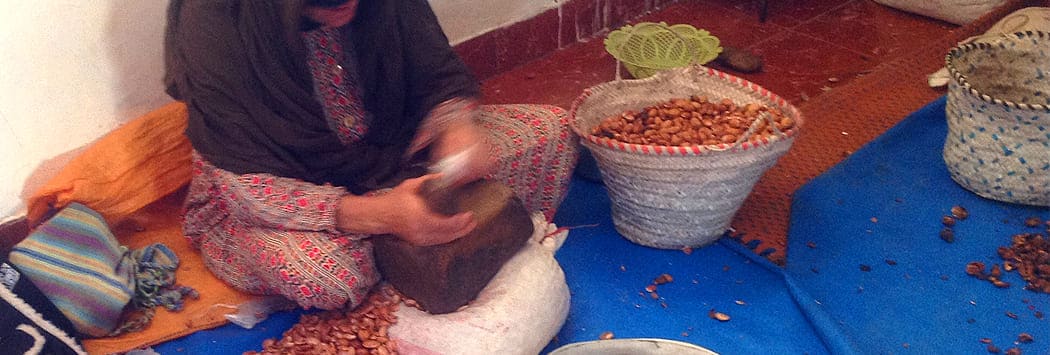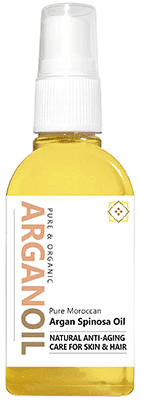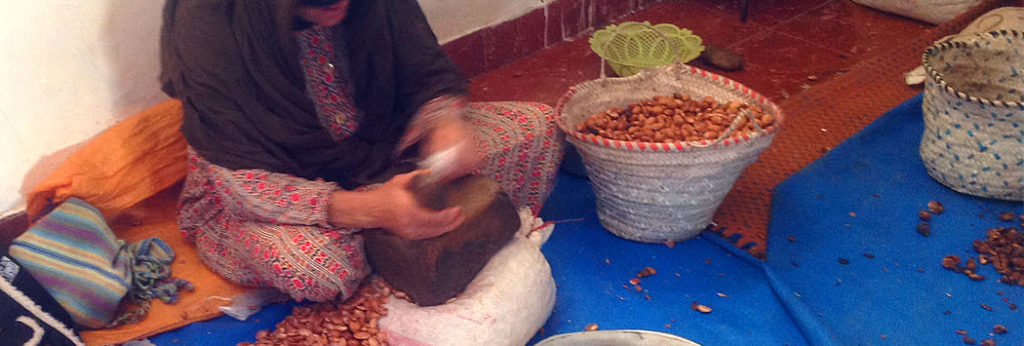The Argan Oil Cooperatives

This is the story of how families came together to create the Argan Oil cooperatives owned by the Berber women of Morocco.
A project that improved health, education, and increased their members’ income by more than ten times.
Who owns the Argan Trees?
Argan Oil has been made for hundreds if not thousands of years by the native inhabitants of Morocco, the Berbers.
In particular the Tashlahate ( Tashelhit ) speaking Berbers of the “Souss”. They occupy the land between Marrakesh to the north and just south of Agadir and from the west coast over towards the Algerian borders.
This is where the Argan forest grow. The more dense regions being closer to the low coastal areas and in the mountains south of Marrakesh.
Traditional Argan Oil Production
Berber women traditionally prepared Argan Oil through a very labour-intensive process with low production yields. This made the commercial sale of Argan Oil outside of Morocco impossible. Today howevr, Argan Oil co-operatives have made large scale production possible.
Families grow Argan trees on small and large plots of land that have been owned by families for generations.
When the Argan fruits ripen in June / July the fruits are picked and left to dry before being stored in large sacks.
Women removed the nut kernels from the nuts and ground them by hand using a grindstone.
Next, water was added to produce an oil-rich dough which is squeezed to extract the Argan Oil.
This is a very labour intensive process. It would take about 1 week and about 20kg of Argan nut kernels to produce just 5 litres of oil.
Foreign Investors & Argan Oil Production
Until the 1990s, there was little international interest in Argan Oil, and export volumes were low.
Traditional processing was sufficient to meet demands. But, as worldwide interest in Argan Oil grew foreign investors came to Morocco seeking to cash-in on this newly discovered resource.
Consequently, they built modern cold-pressing plants far away from the Berber Argan forests in cities like Casablanca. Modern pressing machinery enabled them to produce a higher quality oil with lower water content and longer shelf life at a lower price.
Foreign investment reduced the role of Berber women to little more than raw nut suppliers.
So, by early 2006 there were an estimated 16 private pressing plants owned by foreign investors. Little of the profits from these Argan Oil producing companies found its way back into the communities.
Formation of Argan Oil Cooperatives
Argan Oil expert Professor Zoubida Charrouf worked with the Argan Oil Cooperatives for many years.
As a professor at Mohamed V. University in Morocco, she developed an interest in the Argan tree. Not only the use of its precious oil for skin care and for health but also with a passion for the conservation of this natural resource.
When the project started, Morocco was losing more than 600 hectares of Argan forest each year. By teaching people the value of their trees the professor was able to develop a newfound respect for their valuable forests.
Where once Argan tree wood would be stripped to produce charcoal and animals would graze the trees farmers are now beginning to plant new trees, fence off and protect valuable forest and take good care of the trees.
To help Berber communities compete with the foreign-owned pressing plants NGOs from Europe began to support the development of Berber women’s cooperatives. NGOs provided funding for new mechanical presses and dedicated buildings where farmers could bring their Argan nut kernels for processing.
Additionally, Government and foreign agencies also paid the considerable costs of getting internationally recognised organic certification for the Argan forest and the oil produced.
Furthermore, projects that were started improved the extraction of oil by the involvement of the Berber women in establishing oil-producing cooperatives. By bringing a more business-like approach to the Argan Oil cooperatives Professor Charrouf helped to boost both production levels and the quality of oil.
Now families are able to take their crop to one of the many Berber women’s cooperatives. Here the process of cracking the nuts is done communally by large groups of women. The pressing of the oil done by a modern cold pressing machine.
Authentic Moroccan Oils

Pure Argan Oil 2.03 fl oz
Pure double filtered Organic Argan Oil for a lighter Argan scent.
- 100% Pure Oil
- Certified Organic
- In Stock
- Quality Guarantee
- Free USPS 5-7 Day Tracked Shipping to U.S.
Now $21.22
We sell 2 types of genuine, organic and pure cosmetic Argan Oil.
The first is “Raw, Naturally Scented”. This is an extra-virgin oil cold-pressed and simply filtered.
This grade of oil retains its natural Argan nut scent. It is the prefered choice for blotchy, acne-prone or inflamed skin.
Our “Double-filtrered Unscented” Argan Oil takes the same extra-virgin oil and passes it through a second finer filter. A “double filtered” Cosmetic Argan Oil has less sediment, less water content and very light smell.
It is the mpst popular choice for face, general skin care and hair treatments.
Buy both types of certified, organic Argan Oil for skin and hair from our on-line store.
You can also buy directly from some of our web pages. Click on the “add to cart” buttons to purchase directly through Pay Pal checkout.
Prices include fast and Free Delivery Worldwide and all products are supported by our money-back guarantee.
The Story of Toudarte Imsouane
An Inspiring documentary produced by aroundtheworld.coop
(note: Toudarte means “little village” in Tashlahait. Malika )
The Benefits of the Cooperatives
As a result, increased productivity allowed the women’s cooperatives to compete on an international market.
As the market grew they were able to keep up and benefit from, the growing demand.
This brought much-needed income to the cooperative and families of the region. However, more importantly, it has emancipated the women by offering them a real, sustainable living wage and independence.
Cooperative members now earn around 75 Dirhams/$8.60 a day( 2013), an increase of more than ten times from when the projects started in 1997 and this is a real living wage.
Literacy and numeracy programs, as well as better access to health care, have brought a new freedom, a higher standard of living.
“Being part of the women’s cooperative freed me from tedious domestic work in people’s homes,” said one co-operative member.
“Now I’m learning to read and write and I’ve learned how to ensure the quality of the Argan kernels. The cooperative has made me more independent. I’ve been able to visit other cooperatives in other provinces. I’ve seen how girls and women like me have been able to shape their own destiny and move ahead to develop their cooperatives.”
The Impacts on Health of Literacy Programs Funded by Argan Oil Production
In Morocco, even until very recently, it was not considered necessary for Berber girls to complete or even attend schooling. Tradition decreed that the destiny of girls was marriage. Increased literacy sponsored by the cooperative system in Morocco allows the Berber women more power and independence.
Even older generations have been keen to take up the new opportunity to learn literacy and numeracy. Studies were undertaken to compare the health of illiterate and literate Moroccan Berber women in Holland. In the control groups, which were compared for age, work and partners, it was found that literate people enjoyed significantly better health.
[1] Health and literacy in first- and second-generation Moroccan Berber women in the Netherland
http://www.equityhealthj.com/content/3/1/8

